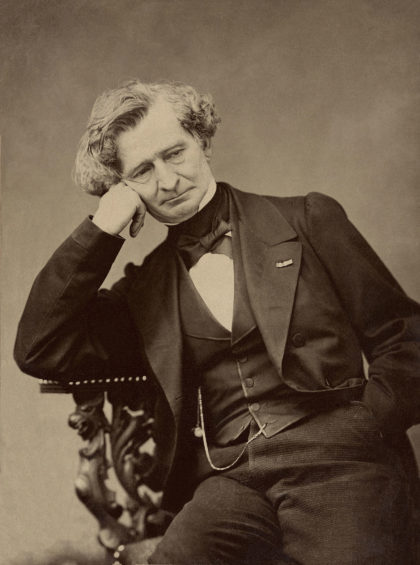 150 years after his death, Hector Berlioz remains one of music’s most fascinating and contradictory figures. He wrote some of the most exciting music ever to be heard in the concert hall, and yet even in a work as popular and electrifying as Symphonie Fantastique, there are moments that many of the most sympathetic musicians and listeners find quite boring. He is best remembered as a maximalist, as the man who doubled the size of the symphony orchestra and brought brass bands into the Requiem, and yet he was capable of penning a work like L’enfance du Christ, a work of obsessive intimacy and delicacy. He was at his best when inspired by God, Satan or opium.
150 years after his death, Hector Berlioz remains one of music’s most fascinating and contradictory figures. He wrote some of the most exciting music ever to be heard in the concert hall, and yet even in a work as popular and electrifying as Symphonie Fantastique, there are moments that many of the most sympathetic musicians and listeners find quite boring. He is best remembered as a maximalist, as the man who doubled the size of the symphony orchestra and brought brass bands into the Requiem, and yet he was capable of penning a work like L’enfance du Christ, a work of obsessive intimacy and delicacy. He was at his best when inspired by God, Satan or opium.
French to his core, he found inspiration in Shakespeare and Byron, acolytes in Mahler and Liszt, and a champion in Schumann. He remains a controversial and under-appreciated figure in his homeland, but has always found champions in the UK, particularly in the lifelong advocacy of Colin Davis.
As a wizard of the orchestra, he was without peer in his day, and the later orchestral innovations of Mahler, Stravinsky and Rimsky-Korsakov are all unthinkable without Berlioz’s inventions. However, even though he wrote a book on orchestration, there many passages in his music which need real help from the performers to bring off. One might say his orchestration is long on magic and short on science. Because he was not an instrumentalist, and perhaps also because his music was so outside of the norms of his time, he was long accused of being close to an amateur, a reputation that was only definitively refuted in the 1950’s and 60’s with the emergence of his music on LP.
He was fascinated by the possibilities of layering musical time, often having musical ideas unfold independently of one another in different phrase lengths or even in different metres. And yet, his music can lack a sense of development and direction. He never developed the quality of musical narrative that makes works by composers as diverse as Beethoven, Dvorak and Tchaikovsky so easy to follow. Instead, like Liszt, it is often the shock of the material he uses, rather than the way in which he develops it, which frequently makes the greatest impression.
And yet, somehow in spite his sometimes-shaky approach to large-scale form, Berlioz became one of music’s greatest dramatists, writing one of the wittiest settings of Shakespeare in opera history, Béatrice et Bénédict and one of the grandest of historical epics, his masterpiece, Les Troyens. Alongside these, one must also mention La damnation de Faust. It is a work that seems to capture this fascinating and enigmatic composer particularly well. It’s a work not completely at home in either the concert hall, for which it was conceived, or in the opera theatre, where it found its first success and is still often encountered. But what a work it is.
It seems that many of Berlioz’ major works were never meant to be mainstream repertoire items, but to be once-in-a-generation events. One can’t easily imagine pieces like the Grande Messe des morts or Les Troyens ever achieving the ubiquity of Mahler 2 or Tristan und Isolde, but heard in the right atmosphere of concentration and given the right sense of occasion, they can be overwhelming. On the other hand, his overtures are almost all gems and should be heard much more often than they are. From a conductors point of view, however, his music is about as fun to conduct as it gets.
This is how you do Berlioz
https://www.youtube.com/watch?v=TJ3TGj8CAyA
He was an instrumentalist, though. He played the flute and I think guitar. His orchestration and harmony are weird in part because he wasn’t a pianist.
I have gotten the bug for Les Troyens very badly; I’ve seen three productions since 2015, bought a used copy of the critical edition (for a mere $200!), and am eagerly awaiting the European opera company season announcements on the chance that I might be able to see it again next season although this rumor of Birtwistle at ENO would take precendence even over Les Troyens.
This, I think, is true: “there many passages in his music which need real help from the performers to bring off. ” I was listening to the first 20 minutes or so of Act V of Les Troyens the other day and I was really struck by how odd the connective tissue of the opera is. I mean, he is just throwing ideas out there and doing nothing with them between the numbers there. I love it all anyway.